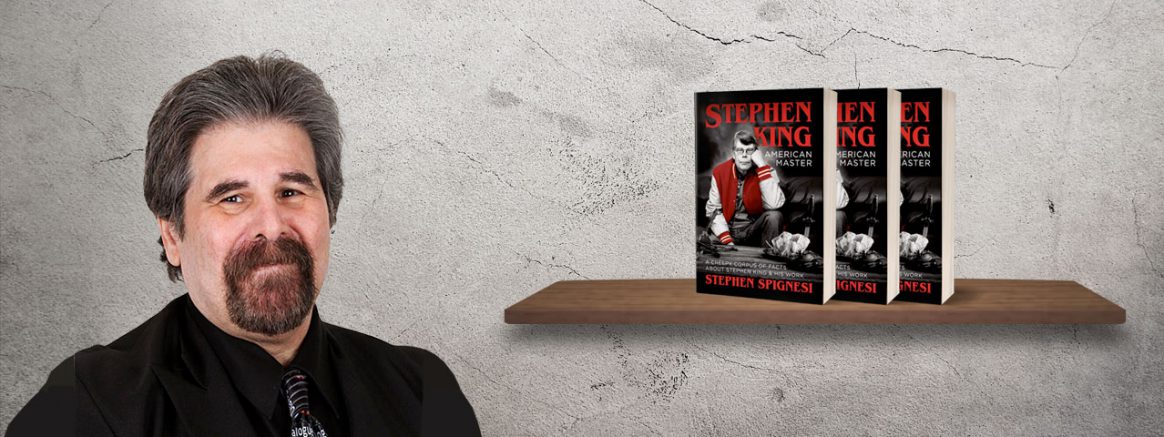
For nearly 30 years, Stephen Spignesi has written about Stephen King. On October 16, he will release his sixth book on the subject.
Stephen King, American Master is described as “a creepy corpus of facts about Stephen King and his work.” Having earned his place in the pantheon of Stephen King “experts,” Spignesi is frequently asked to talk about King and his impact on American culture – but it is a rare occurrence in which Spignesi talks about himself. In this exclusive interview, Spignesi speaks to his own history as a Constant Reader, how he began his love of King, and why the author continues to inspire him.
JS: Having written six books on Stephen King since 1990, what can you tell us about Stephen King, American Master that sets it apart from the rest?
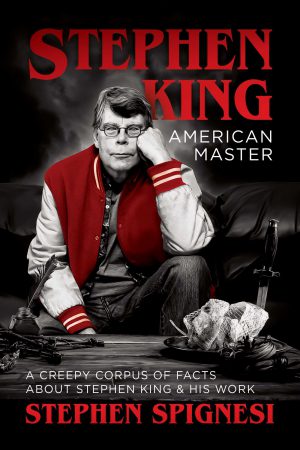
SS: My first book about King was The Complete Stephen King Encyclopedia (published in a limited edition as The Shape Under the Sheet). This was what it sounds like: an 800,000-word, 8½ x 11 encyclopedia of the people, places, and things in King’s work, through Four Past Midnight. There are also a ton of other features in the book, including 30 interviews, talks with his brother David, his assistant Shirley, his sister- and brother-in-law Stephanie and Chris Spruce; writers, directors, and other stuff like a complete Castle Rock index, “How King Kills,” several indexes, art, fiction, and more. It took me five years to research and write with one assistant.
I then did the two Stephen King Quiz Books, and then The Lost Work of Stephen King and The Essential Stephen King, which was a ranking of what I considered to be King’s 100 greatest works at the time. Fast forward 17 years and two dozen books later. I decided I wanted to do a new book about King’s work, but something that would appeal to all manner of fans: casual, serious, academic, collector, and fanatic.
So, Part 1 of Stephen King, American Master is a collection of essays and interviews by many of the notables in the King community, including Bev Vincent, Robin Furth, Michael Collings, Hans-Ake Lilja, Justin Brooks, Stanley Wiater, Mick Garris, RC Matheson, Andrew Rausch, Kevin Quigley, Jay Holben, Anthony Northrup, James Cole, and more. Plus, it’s got a reprint of an interview I did a long time ago with Richard Matheson in which he talks about Stephen King’s work.
Part 2 is a fun, bullet-point overview of all of King’s mainstream body of work, plus looks at uncollected rarities, and other unusual works many King fans may not be aware of. I tried for both a reading and browsing book with the structure. Plus, there’s a fascinating feature about two white silk jackets that I think fans will enjoy.
JS: You would think after so many years that most of the behind-the-scenes stories of Stephen King have all been told, but I often find in my own research that this is not the case. I’m always amazed at the treasure trove of stories that still have not seen the light of day in print. In your research for the new book, did you find any new stories you hadn’t heard of before?
SS: Yes. Over the years I have come across a bunch of unpublished stories in manuscript. Some came from the late great super collector Charlie Fried who, before his passing, bought a massive collection of King memorabilia. Some were from dealers. Some were from the Special Collection at the Fogler Library at the University of Maine at Orono thanks to the late Rocky Wood. King’s office sent me Slade when I was working on the Encyclopedia. Childhood writings, poetry, and other miscellanea came from a wide array of sources in the King community. I talk about some of them in American Master.
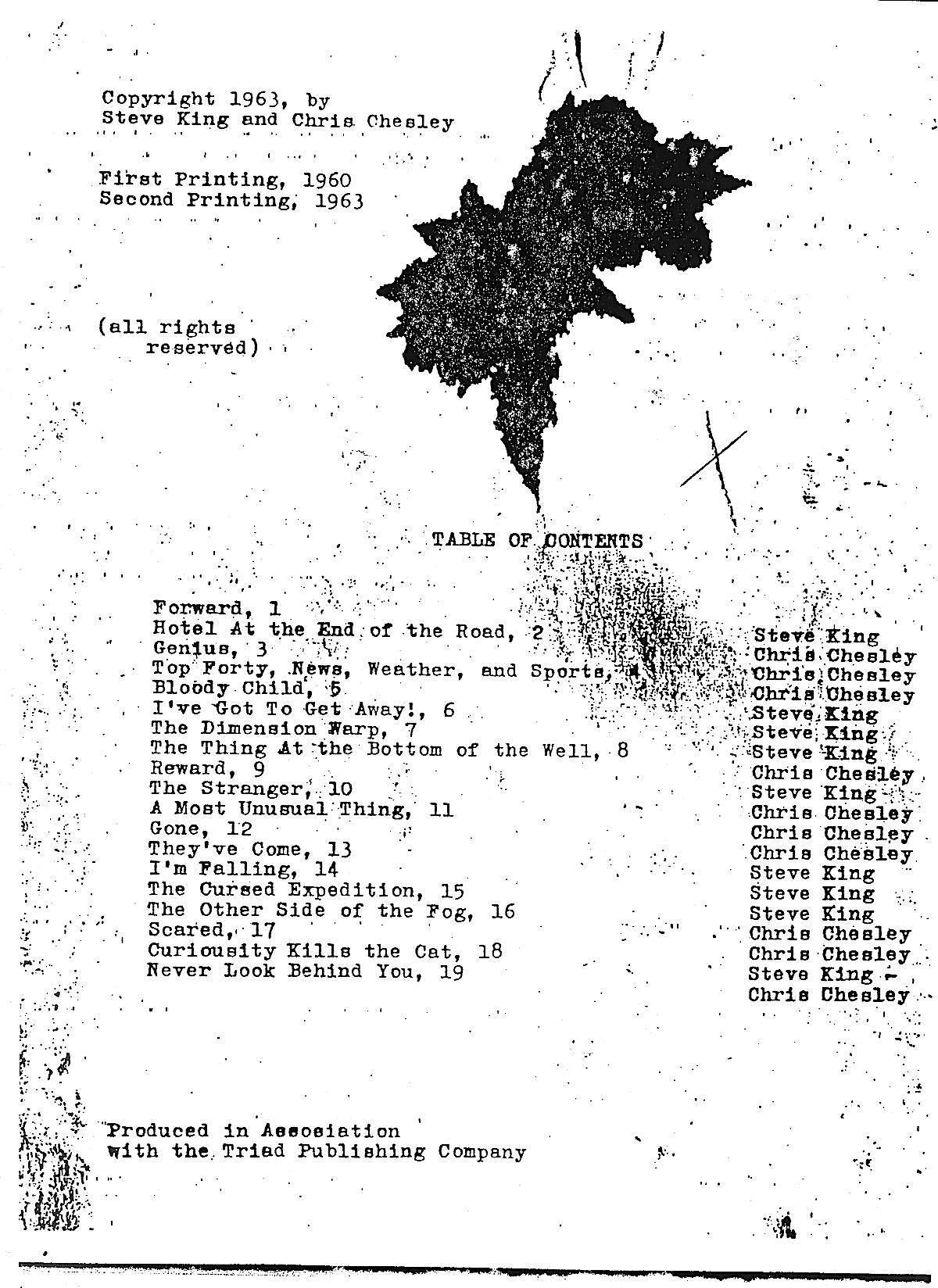
Front cover of a long lost typed collection of 1-page short stories Stephen King published and sold when he was 13 years old. Each story is discussed in Spignesi’s new book Stephen King, American Master.
JS: Let’s go back to the beginning. What was the first Stephen King book you ever read, and how did it affect you? Were you instantly a Constant Reader?
SS: The first Stephen King book I ever read was The Shining in 1977. Hell of an introduction to King, wouldn’t you say? And yes, I was instantly addicted and became a Constant Reader to the nth degree. I then went back and read Carrie and ‘Salem’s Lot, and read Night Shift and The Stand the next year the moment they were released. From that moment, I began collecting, reading, and studying King’s work.
JS: What is your favorite King book of all time, and why?
SS: I’ll give you the complete rundown. My favorite novel is It. It’s a virtuoso, epic tale that immediately became a classic that gave us Pennywise and ruined the clown business. (That’s not a joke. I have friends who are professional clowns and they’ve told me bookings for parties and appearances are down thanks to Pennywise. I think that’s kind of funny.)
My favorite nonfiction book is On Writing. It’s a brilliant writing tutorial. I taught the book in my Comp & Lit courses. If writers read one book about the craft of writing, On Writing should be it.
My favorite novella collection is Different Seasons. It’s got Shawshank, The Body, Apt Pupil, and The Breathing Method. An incredible collection.
My favorite short story collection is Bazaar of Bad Dreams. This is a great collection that includes some classic SK tales, like “Herman Wouk is Still Alive,” “Obits,” “Afterlife,” and “That Bus is Another World,” but also more mainstream, literary offerings like “Premium Harmony,” and “A Death.”
My favorite poem is “Paranoid: A Chant.” The narrator in this poem is what J. Alfred Prufrock probably would have ultimately become if his depression, alienation, and paranoia were allowed to blossom. It’s a great look inside the mind of a paranoid schizophrenic.
My favorite nonfiction essay is a tie between “Remembering John” and “Five to One, One in Five.” “Remembering John” is King’s eulogy of sorts for John Lennon. “Five to One” is a remembrance of and re-creation of King’s college years. Both are truly great essays.
My favorite play is Thin Scenery. I love this short play because it’s a surreal, delusional mind-bending experience. My hope is to see it performed one day.
My favorite screenplay is Golden Years. I loved this TV show when it aired and revisit it on DVD now and then. King is a terrific science fiction writer and this is a series that ended too soon.
My favorite Rock Bottom Remainders song is “Bo Diddley,” sung by King, from their Stranger Than Fiction CD. King belting out “Bo Diddley bought a diamond ring…”? ‘Nuff said. (Plus this track has Steely Dan’s Jeff “Skunk” Baxter on it. Big fun.)
My favorite unpublished story is “Happy Stamps.” It’s a fun story based on real experiences from King’s childhood. Those stories tend to be a cut above.
JS: For being predominantly considered a horror author, I tend to find much spirituality woven through King’s many works. Do you find this to be the case?
SS: Absolutely! King is a morality “master,” in the sense of being a teacher. He’s an adept; a guide through the darkness. It’s not a coincidence that a dominant theme in much of his work is the Night Journey: a traveler (character) comes to a tunnel, or forest, or desert, etc. of darkness, travels through and experiences, physical, spiritual, and moral tribulations, and emerges into the light. Sometimes it’s blatant: Larry Underwood in the Lincoln Tunnel in The Stand, or Gary’s survival after meeting the man in the black suit—the devil—face-to-face in the story of the same name. Sometimes it’s subtle: Stella’s walk across the ice in “The Reach.”
JS: Stephen King and Owen King did a short tour last year to promote their novel, Sleeping Beauties. Each night, Owen would bring out your book, The Stephen King Quiz Book, to quiz his dad on his own work. Gosh, that must have felt good. What did you think when you heard this?
SS: That was a truly exciting moment for me. I know Owen, but I had no idea he was going to do that. I was flattered and just plain gobsmacked when Dave Hinchberger (the publisher of the limited edition of Stephen King, American Master) told me.
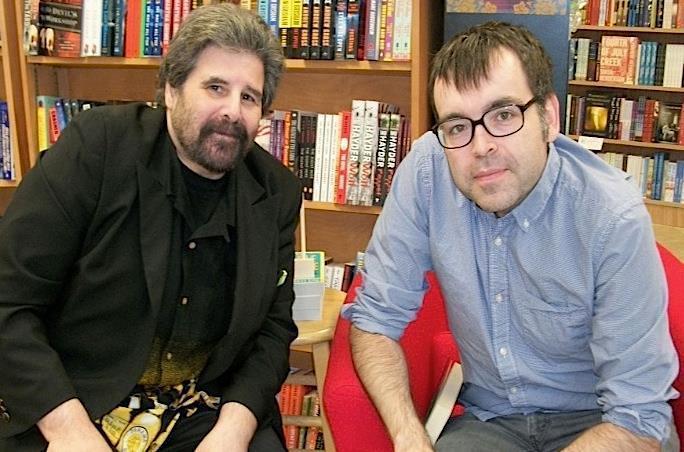
Stephen Spignesi (left) with Owen King (right) taken during a signing for Owen King’s book, Double Feature. An interview Owen King conducted with his father Stephen King is included in Spignesi’s new book, Stephen King, American Master.
JS: Any chance of a Stephen King Quiz Book 3 in the making?
SS: Probably not, but never say never, right? The second volume of the Quiz Book was published in 1992. So that means that there’s 26 years of King material to re-read, take notes on, and write quizzes about. The two Quiz Books happened because I had been working on the King Encyclopedia and was able to do the books as a spin-off. Plus, King was still with Penguin (which published the Quiz Books), so they liked the idea of books to tie in with King’s own work. I can’t imagine how much time it would take to do the hypothetical book I have been fancifully calling The Complete Stephen King Quiz Book.
JS: One of your books, The Lost Work of Stephen King, includes as you put it “unpublished manuscripts, story fragments, alternative versions, and other oddities.” What do you feel is the best lost work of King’s that you’ve encountered in all of your research?
SS: For me personally, it’s the short story “Squad D,” although it is being published in 2018 in Shivers VIII from Cemetery Dance so it’s technically no longer “lost.” I love the story. I’m a sucker for… well, if I tell you what I’m a sucker for it would be a huge spoiler, so fuggedabout it. But that story’s a particular favorite of mine.
JS: You’ve done a great deal of work not related to Stephen King as well. Books on everything from V.C. Andrews to Native American history and the gnostic gospels. It strikes me that you are, above all else, a collector – of facts, trivia, and information. Is this just because you have a talent for research, or have you always been such a ‘collector’ for lack of a better word?
SS: Maybe both? It’s probably my way of working through deep-seated OCD and anal-retentive tendencies. Which brings to mind Woody Allen’s remark to Diane Keaton in Annie Hall, “I’m anal.” Her response? “That’s a polite word for what you are.” But seriously, folks… I’ve always liked to collect and pile up facts from reading and research. I’ve been fortunate to be able to turn a lot of that collecting into books. But it also makes me nervous that I’ll get something wrong, which is the curse of the nonfiction writer. There’s a tremendous freedom in fiction that there isn’t in nonfiction. In my novel Dialogues, I invented a whole animal shelter procedure that was totally wrong for the state of Connecticut. But it worked for the book. You can’t do that with fact-based writing.
JS: What books are you working on next?
SS: I’m writing a sequel to my Grover Cleveland’s Rubber Jaw book called Mary Lincoln’s Séances. I’m also working on two nonfiction books called The Executioner’s Handbook and Mozart’s Migraines. I also just started a novel called The Healer, but that’s brand new so I don’t know if it’ll go anywhere. I do like the first chapter though. I’m also writing a screenplay that is an adaptation of a nonfiction memoir about a young boy who grew up in Cape Verde and suffered unimaginable abuse, yet managed to emigrate to the U.S. and is now a successful business owner and motivational speaker.
JS: In all your years writing about Stephen King, have you ever had the chance to meet him?
SS: Nope. Talked to him once for a few seconds on the phone when I called his office to speak to his assistant Shirley for the King Encyclopedia, but it was a “Hang on a minute, I’ll get her” type of call.
JS: After so many books on King, what compels you to so frequently return to the subject of his work?
SS: Actually, Stephen King, American Master is my first book about King in 17 years. But I understand the context of your question and the answer is that King’s work has an appeal to me that is paramount in my aesthetic sensibility. I appreciate it, admire it, and enjoy it. Thus, I follow what he does, I read it, and now I’ve written about it again after a hiatus.
I consider all of us fortunate to be living in a time when King is working. And I feel the same way regarding Paul McCartney. In 50, 100 years, people will still be appreciating their work. We’re living in a time when they’re still creating. Imagine being alive when Dickens was publishing, or Twain, or in the 40s when Rodgers and Hammerstein’s classic musicals were being debuted as new. I try not to take artists for granted. And when I enjoy the work so much, it’s much easier to be fully committed.
Next month: Bill Thompson, the former Doubleday editor who discovered Stephen King and is responsible for editing King’s earliest books, takes my questions and yours. Email me your questions for Bill at sechrestthings@gmail.com.





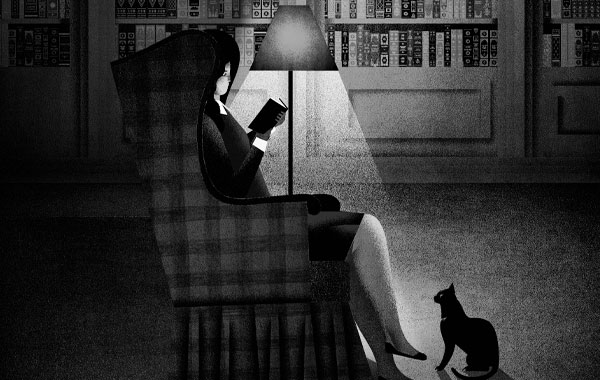


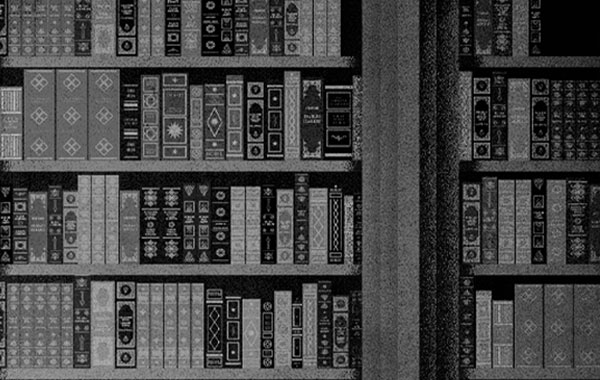

Candy Cornett
What a great and interesting interview, Jason. I noticed that King’s first books were published by Penguin. Could this be what gave him the idea to use a ceramic penguin in Misery?